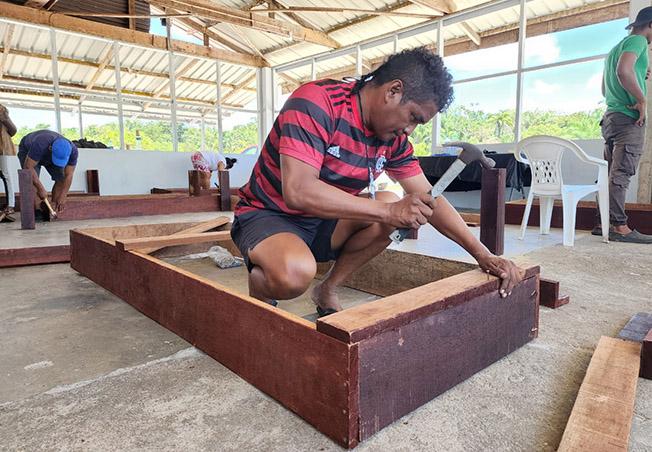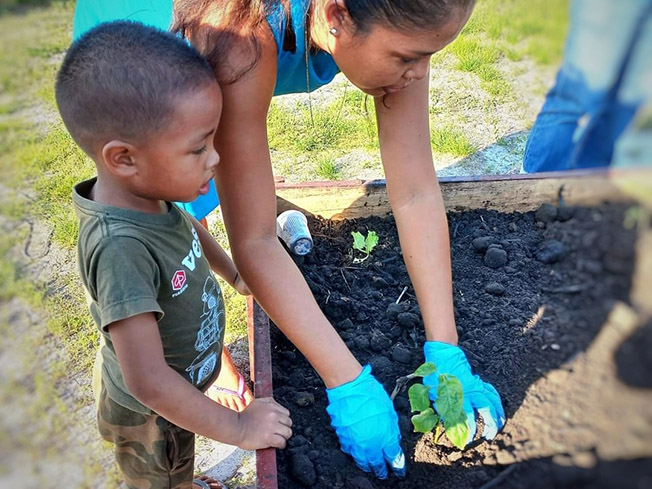Climate change affects the entire world, but some people feel the effects harder than others, such as indigenous communities. The consequences of climate change manifest themselves in the form of extreme weather conditions, drying up of rivers and food security problems. Sowing and harvest times are becoming unpredictable, compromising traditional agricultural practices.
Milten Lasoe, a resident who has lived in the indigenous village of Wit Santi in Suriname for 10 years, has witnessed these consequences. The production of pineapple, cassava and other crops has decreased. He says that it has become very hot, with the result that the savannah sand retains so much heat that not much can be planted. “But some crops such as cassava and other earth fruits survive. I’ve tried, but I’ve seen them not come true. Planting is especially difficult during the dry season,” says Lasoe.In an effort to strengthen the resilience of the Wit Santi indigenous community to the impacts of climate change, the ‘Building Climate Resilient Indigenous Communities’ project recently reached a significant milestone.
No fewer than 5% of the 450 families in the village were trained from September 29 to October 1, 2023 in the application of agricultural methods that are resistant to climate change. Each family was represented by one person. During this project, the participants learned how to make a planter that is resistant to the effects of climate change and how to plant in it.

Project coordinator Nuravni Sallons says that she took the initiative after the Aurae Opus Foundation conducted a climate study in Wit Santi in December 2022. This shows that several households are struggling with the consequences of climate change, especially when it comes to planting and guaranteeing their harvest. “They’ve had to deal with rising temperatures, falling precipitation and generally hot weather.
As a result, they have seen a decline in their production in recent years. So the idea arose to do the project to teach the residents alternative methods of agriculture and to give them the skills,” says Sallons. The main goal of the project is self-reliance, climate resilience and food security.According to Sallons, planting in raised beds is an easy and budget-friendly method because the containers are made of wood. “If a participant can find wood, they can make their own container.” The residents generally produce pineapple, cassava and other earth fruits, but the participants were also allowed to indicate their preference for vegetables for the project. Lasoe says that the project meant a lot to him and gave him a push to start his own business.
He indicates that he has learned a lot about plants, where to put the plant, how to fertilize and which fertilizers to use. He says that it has become very hot and that not much can be planted. “Only earth fruits survive, so planters are the right solution. The plants will survive in a container and you can move the container. I was already working on a tent with shade mesh, but they explained to me that not everything can fit in a tent with shade mesh. Certain plants need sun all day, but others do not.”

Sallons indicates that the intention is that participants can continue with the skills they have been given. After the training, participants will be monitored for assistance and questions in the coming months. The project will last until the end of December and will be carried out in collaboration with the Aurae Opus Foundation and Tiny Gardens Suriname.
The project is funded by the US Department of State Bureau of Educational and Cultural Affairs in collaboration with the Meridian International Center as implementing partner and the International Visitor Leadership Program.According to Sallons, this project contributes to increasing climate awareness and climate justice in Suriname because it has already created awareness among participants about the decrease in their harvest due to climate change. This awareness has led to the search for alternatives and finding solutions. The positive effect extends to other villagers and nearby communities, who see that there are viable alternatives.
The project is based on the pursuit of climate justice, because indigenous communities are often not sufficiently involved in decision-making regarding climate change despite being hit hard by the consequences. This is seen as an injustice, and the project sought to change this. The central position is that everyone has the right to good nutrition, regardless of circumstances, whether due to climate change or other causes. Sallons aims to expand the project to reach more vulnerable communities.
This story was published by Starnieuws with the support of the Caribbean Climate Justice Journalism Fellowship, which is a joint venture between Climate Tracker and Open Society Foundations.